Abstract
Objectives
To analyse development of individual nontechnical skills (NTS) domains after undertaking a previously developed simulation-based training model and analyse the relationship between technical skills (TS) and NTS in ophthalmic surgery.
Methods
The simulation-based training model involved a cataract surgery case complicated by intraoperative posterior capsule rupture. Cataract surgeons underwent the simulation twice, separated by a training intervention. Two blinded independent experts assessed participants’ NTS using HUFOES, NOn-Technical Skills for Surgeons (NOTSS), and the OSATS global rating scale for TS. Paired t-tests assessed differences in individual NTS domains, with p < 0.05 indicating significance. The Pearson Product Moment Correlation Coefficient was used to assess the correlation between scores from each scoring system.
Results
All NTS domains within HUFOES and NOTSS demonstrated statistically significant improvements secondary to the training intervention. Positive correlations were demonstrated between HUFOES and OSATS scores in the pre- and post-training simulations, r = 0.870 (p < 0.001) and r = 0.861 (p < 0.001), respectively. Positive correlations were also demonstrated between NOTSS and OSATS scores in pre- and post-training simulations, r = 0.849 (p < 0.001) and r = 0.757 (p = 0.001), respectively. Positive correlations were demonstrated between HUFOES and NOTSS scores; r = 0.979 (p < 0.001) (n = 17) and r = 0.959 (p < 0.001) for pre- and post-training simulations, respectively.
Conclusion
All NTS domains contained within HUFOES and NOTSS demonstrated significant increases following the completion of the simulation-based training model. Positive correlations exist between an ophthalmic surgeon’s TS and NTS. This is the first study to report these findings within ophthalmic surgery.
This is a preview of subscription content, access via your institution
Access options
Subscribe to this journal
Receive 18 print issues and online access
$259.00 per year
only $14.39 per issue
Buy this article
- Purchase on Springer Link
- Instant access to full article PDF
Prices may be subject to local taxes which are calculated during checkout
Similar content being viewed by others
Data availability
Data collected, used and analysed for the present article is not openly available due to reasons of participant confidentiality, however anonymized data can be accessed upon reasonable request submitted directly to the Corresponding Author.
References
Wood TC, Maqsood S, Nanavaty MA, Rajak S. Validity of scoring systems for the assessment of technical and non-technical skills in ophthalmic surgery-a systematic review. Eye. 2021;35:1833–49.
Raison N, Wood T, Brunckhorst O, Abe T, Ross T, Challacombe B, et al. Development and validation of a tool for non-technical skills evaluation in robotic surgery-the ICARS system. Surg Endosc. 2017;31:5403–10.
Wood TC, Maqsood S, Zoutewelle S, Nanavaty MA, Rajak S. Development of the HUman Factors in intraoperative Ophthalmic Emergencies Scoring System (HUFOES) for non-technical skills in cataract surgery. Eye. 2021;35:616–24.
Yule S, Parker SH, Wilkinson J, McKinley A, MacDonald J, Neill A, et al. Coaching non-technical skills improves surgical residents’ performance in a simulated operating room. J Surg Educ. 2015;72:1124–30.
Yule S, Flin R, Paterson-Brown S, Maran N, Rowley D. Development of a rating system for surgeons’ non-technical skills. Med Educ. 2006;40:1098–104.
Steeples LR, Hingorani M, Flanagan D, Kelly SP. Wrong intraocular lens events - what lessons have we learned? A review of incidents reported to the National Reporting and Learning System: 2010-2014 versus 2003-2010. Eye. 2016;30:1049–55.
Simon JW, Ngo Y, Khan S, Strogatz D. Surgical confusions in ophthalmology. Arch Ophthalmol. 2007;125:1515–22.
Catchpole K, Panesar S, Russell J, Tang V, Hibbert P, Cleary K. Surgical safety can be improved through better understanding of incident reported to a national database. Nat Patient Saf Agency. 2009;1:37.
Yule S, Flin R, Paterson-Brown S, Maran N. Non-technical skills for surgeons in the operating room: a review of the literature. Surgery. 2006;139:140–9.
Gawande AA, Zinner MJ, Studdert DM, Brennan TA. Analysis of errors reported by surgeons at three teaching hospitals. Surgery. 2003;133:614–21.
Brunckhorst O, Khan MS, Dasgupta P, Ahmed K. Nontechnical skill training and the use of scenarios in modern surgical education. Curr Opin Urol. 2017;27:330–6.
Turnbull AMJ, Lash SC. Confidence of ophthalmology specialist trainees in the management of posterior capsule rupture and vitreous loss. Eye. 2016;30:943–8.
Lee R, Raison N, Lau WY, Aydin A, Dasgupta P, Ahmed K, et al. A systematic review of simulation-based training tools for technical and non-technical skills in ophthalmology. Eye. 2020;34:1737–59.
Chan E, Mahroo OAR, Spalton DJ. Complications of cataract surgery. Clin Exp Optom. 2010;93:379–89.
Ionides A, Minassian D, Tuft S. Visual outcome following posterior capsule rupture during cataract surgery. Br J Ophthalmol. 2001;85:222–4.
Zevin B, Levy JS, Satava RM, Grantcharov TP. A consensus-based framework for design, validation, and implementation of simulation-based training curricula in surgery. J Am Coll Surg. 2012;215:580–6.
Benjamin L. Selection, teaching and training in ophthalmology. Clin Exp Ophthalmol. 2005;33:524–30.
Wood TC, Maqsood S, Saunders A, Sancha W, Nanavaty MA, Wearne M, et al. Non-technical skills simulation-based training model for managing intraoperative posterior capsule rupture during cataract surgery. Eye. 2023;37:474–9.
Martin JA, Regehr G, Reznick R, MacRae H, Murnaghan J, Hutchison C, et al. Objective structured assessment of technical skill (OSATS) for surgical residents. Br J Surg. 1997;84:273–8.
Wood TC, Raison N, Haldar S, Brunckhorst O, McIlhenny C, Dasgupta P, et al. Training tools for nontechnical skills for surgeons—a systematic review. J Surg Educ. 2017;74:548–78.
Rogers GM, Oetting TA, Lee AG, Grignon C, Greenlee E, Johnson AT, et al. Impact of a structured surgical curriculum on ophthalmic resident cataract surgery complication rates. J Cataract Refract Surg. 2009;35:1956–60.
Pena G, Altree M, Field J, Sainsbury D, Babidge W, Hewett P, et al. Nontechnical skills training for the operating room: a prospective study using simulation and didactic workshop. Surgery. 2015;158:300–9.
Frank JR, Danoff D. The CanMEDS initiative: implementing an outcomes-based framework of physician competencies. Med Teach. 2007;29:642–7.
Scott DJ, Dunnington GL. The new ACS/APDS skills curriculum: moving the learning curve out of the operating room. J Gastrointest Surg. 2008;12:213–21.
Azuara-Blanco A, Reddy A, Wilkinson G, Flin R. Safe eye surgery: non-technical aspects. Eye. 2011;25:1109–11.
Brunckhorst O, Shahid S, Aydin A, Khan S, McIlhenny C, Brewin J, et al. The relationship between technical and nontechnical skills within a simulation-based ureteroscopy training environment. J Surg Educ. 2015;72:1039–44.
Brunckhorst O, Shahid S, Aydin A, McIlhenny C, Khan S, Raza SJ, et al. Simulation-based ureteroscopy skills training curriculum with integration of technical and non-technical skills: a randomised controlled trial. Surg Endosc. 2015;29:2728–35.
Sommer K. Pilot training: what can surgeons learn from it? Arab J Urol. 2014;12:32–5.
Todd MA, Thomas MJ. Experience, competence, or syllabus? Influences on flight hours at licensing of commercial pilots. Int J Aviat Psychol. 2013;23:169–80.
Saleh GM, Wawrzynski JR, Saha K, Smith P, Flanagan D, Hingorani M, et al. Feasibility of human factors immersive simulation training in ophthalmology the London pilot. JAMA Ophthalmol. 2016;134:905–11.
Arora S, Sevdalis N, Nestel D, Woloshynowych M, Darzi A, Kneebone R. The impact of stress on surgical performance: a systematic review of the literature. Surgery. 2010;147:318–30.
Maymand MM, Shakhsian F, Hosseiny FS. The effect of stress on flight performance. World Appl Sci J. 2012;19:1381–7.
Hassan I, Weyers P, Maschuw K, Dick B, Gerdes B, Rothmund M, et al. Negative stress-coping strategies among novices in surgery correlate with poor virtual laparoscopic performance. Br J Surg. 2006;93:1554–9.
McCulloch P, Mishra A, Handa A, Dale T, Hirst G, Catchpole K. The effects of aviation-style non-technical skills training on technical performance and outcome in the operating theatre. BMJ Qual Saf. 2009;18:109–15.
Wood TC, Maqsood S, Sancha W, Saunders A, Lockington D, Nanavaty MA, et al. Principles of simulation and their role in enhancing cataract surgery training. Eye. 2022;36:1529–31.
Baxter JM, Lee R, Sharp JAH, Foss AJE. Intensive cataract training: a novel approach. Eye. 2013;27:742–6.
Staropoli PC, Gregori NZ, Junk AK, Galor A, Goldhardt R, Goldhagen BE, et al. Surgical simulation training reduces intraoperative cataract surgery complications among residents. Simul Healthc. 2018;13:11.
Wood TC, Maqsood S, Sancha W, Nanavaty MA, Rajak S. Comparisons between cataract surgery and aviation. Eye. 2022;36:490–1.
Pal A, Lal R, Frizelle F. Aviation-based teamwork skills work for surgeons: time for an “aviation bundle”? ANZ J Surg. 2018;88:1231–5.
Gaba DM. The future vision of simulation in health care. BMJ. Qual Saf. 2004;13:2–10.
Lockington D, Saleh GM, Spencer AF, Ferris J. Cost and time resourcing for ophthalmic simulation in the UK: a Royal College of Ophthalmologists’ National Survey of regional Simulation Leads in 2021. Eye. 2022;36:1973–6.
Acknowledgements
The authors thank the Simulation department at the University Hospitals Sussex (UHSussex) NHS Trust for helping with simulation semantics. The authors are also grateful to: Theatre staff: Jenny Brookes, Vasiliki Xenaki, Chris Tully, Letizia Buccoliero, Tina McMilan, Regis Chaco, Myrna McHarg and Philip Harris. Consultants: Edward Hughes, Dominic Heath. Trainees: Hasan Naveed, Simerdeep Kaur, Hanbin Lee, Christopher Holmes, Ahmed Roble, Vidushi Golash, Patrick Idam, Jamal Sawan, Radhika Dashputra, Huw Oliphant, Tristian Mann, Gabriela Ortiz, Krystian Kyza. Management: Emma Goudman, Alex Shaw, Jane McNevin, and Neil Vine.
Author information
Authors and Affiliations
Contributions
TCW contributed to the study’s concept and design, data acquisition and statistical analysis, drafting and revision of the manuscript, administrative and technical support throughout the study, and final approval of the manuscript. SM contributed to the study’s concept and design, data acquisition and statistical analysis, drafting and revision of the manuscript, administrative and technical support throughout the study, provided regular supervision, and approved the final manuscript. AS contributed to the study’s concept and design, data acquisition, revision of the manuscript, administrative and technical support throughout the study, provided regular supervision, and approved the final manuscript. WS contributed to the study’s concept and design, revision of the manuscript, administrative and technical support throughout the study, provided regular supervision, and approved the final manuscript. MAN contributed to the study’s concept and design, data analysis, drafting and revision of the manuscript, administrative and technical support throughout the study, provided regular supervision, and approved the final manuscript. MW contributed to data acquisition, drafting and revision of the manuscript, technical support throughout the study, provided supervision, and approved the final manuscript. SR contributed to the study’s concept and design, data acquisition and statistical analysis, drafting and revision of the manuscript, administrative and technical support throughout the study, provided regular supervision, and approved the final manuscript.
Corresponding author
Ethics declarations
Competing interests
None of the authors have any financial interest in any product or procedures mentioned in this manuscript. Other disclosures are as follows: TCW, AS, WS, MW and SR: None. SM: Research grant from NuVision biotherapies. MAN is a member of the Eye editorial board. Research grants from Alcon Laboratories, USA; European Society of Cataract and Refractive Surgery; Johnson & Johnson, USA; Rayner Intraocular lenses, UK, Ziemer, Switzerland. Lecture fees from Alcon Laboratories, USA. Consultant to Alcon, Johnson & Johnson, Hoya & Ziemer. Travel grant from Alcon Laboratories, USA & Bausch & Lomb, USA
Additional information
Publisher’s note Springer Nature remains neutral with regard to jurisdictional claims in published maps and institutional affiliations.
Rights and permissions
Springer Nature or its licensor (e.g. a society or other partner) holds exclusive rights to this article under a publishing agreement with the author(s) or other rightsholder(s); author self-archiving of the accepted manuscript version of this article is solely governed by the terms of such publishing agreement and applicable law.
About this article
Cite this article
Wood, T.C., Maqsood, S., Saunders, A. et al. Simulation-based training for intraoperative posterior capsule rupture management: an analysis of nontechnical skills development and the relationship between technical and nontechnical skills. Eye (2024). https://doi.org/10.1038/s41433-024-03051-y
Received:
Revised:
Accepted:
Published:
DOI: https://doi.org/10.1038/s41433-024-03051-y



